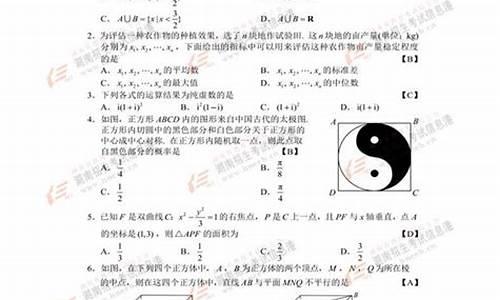您现在的位置是: 首页 > 教育政策 教育政策
高考状语从句讲解-状语从句高考题
tamoadmin 2024-09-30 人已围观
简介1.一道上海2010年英语高考的题目,需要详细解答O(∩_∩)O谢谢2.2021年天津3月英语高考解析3.强调句与定语从句,主语从句是用it 作形式主语时,状语从句三个的区别?4.求高考英语 谓语,非谓语,情态动词,虚拟语气,名词性从句,状语从句,特殊从句的用法,非常感谢!5.高考英语语法:高中英语语法-as 引导的各种从句之一一道上海2010年英语高考的题目,需要详细解答O(∩_∩)O谢谢首先要
1.一道上海2010年英语高考的题目,需要详细解答O(∩_∩)O谢谢
2.2021年天津3月英语高考解析
3.强调句与定语从句,主语从句是用it 作形式主语时,状语从句三个的区别?
4.求高考英语 谓语,非谓语,情态动词,虚拟语气,名词性从句,状语从句,特殊从句的用法,非常感谢!
5.高考英语语法:高中英语语法-as 引导的各种从句之一
一道上海2010年英语高考的题目,需要详细解答O(∩_∩)O谢谢

首先要知道这个句子的前半部分是一个状语从句,你可以理解为前面的开头总能转化为no matter 。。。的形式。如果要用what的话,就应该是no matter what a serious problem you may have, 或者是Whatever a serious problem you may have.语义上讲,句子的结构是无论你有什么样的困难。。。
B表达不出无论的意思。从语法的层面上讲, B. What a serious problem
是一个名词性的从句,因此也是不对的。
喷嚏文化的理解与我相似
2021年天津3月英语高考解析
1.I was trying to place an order on your website, but I failed.
.I can take your order over the phone.
A. That's fineB. No wayC. My pleasureD.Of course答案A
详解考查情景交际。句意:一—我想在你们的网站上下订单,但是我失败了。——我可以通过电话帮您点餐。A. That's fine 没关系;B. No way 不行,没门:C. My pleasure 不客气:D.Of course当然。根据“I can take your order over the phone”可知,此处表示没有关系。故选A。
2. I wanted to make dumplings but found I had flour, so I went out to buy some.
A. made up forB. run out ofC. kept away fromD. got down to答案B
详解考查动词短语辨析。句意:我想包饺子,但发现我的面粉用完了,所以我出去买了
一些。A. made up for 弥补:B.run out of用完,用尽:C. kept away from 远离,回避:D. got
down to开始认真做。结合句意,此处指“用完”了面粉。故选B。
3. Feeling fearful is healthy_it helps you slow down and evaluate risks properly.
A. because B. untilC.beforeDalthough
答案A
详解考查连词词义辨析。句意:感到恐惧是有益于健康的,因为它能帮助你慢下来,正确评估风险。A.because因为;B.until 直到:C. before 在……之前:D.although虽然。根据语境,主句提到 healthy(有益于健康的),连词引导的从句部分则在其体描还为何说是有益于健康的,这是一个原因状语从句,适应because(因为)引导,故选A。
4. Mark is a genius. By the time he graduated, he _jobs by a dozen computer companies.
A. has offeredC. had offeredB. has been offeredD. had been offered答案D
详解考查过去完成时的被动语态。句意:马克是个天才。到他毕业的时候,已经有十几家电脑公司给他提供了工作机会。该句是复合句,含By the time引导的时间状语从句,主句动作先于从句动作,且主句主语he和谓语动词offer之间是被动关系,是过去完成时的被
动语态。故选 D.
5. The police searched the area for several days were looking for.
详解考查副词词义辨析。句意:警察在这一地区搜查了好几天。最终,他们找到了他们一直在努力寻找的证据。A.Generally 通常,普遍地;B.Originally 起初,原来,独创地;C.Eventually 最终:D. Unfortunately 不幸地。分析句意,警察一直在努力找证据,努力有了结果,最终找到了,故选C。
强调句与定语从句,主语从句是用it 作形式主语时,状语从句三个的区别?
***************以下内容参考 龙 敏《It强调句型全接触》(知网上可查阅到)***********
与主语从句、定语从句、状语从句的比较
It强调句型易与一些从句(如主语从句、定语从句、状
语从句)混淆。此时,判断一个句子是否为强调句的最常
用最简单的办法就是还原法:去掉句中的“it is/was”和
连接词后,看剩下的部分是否为一个结构完整的句子,如
果不是,则肯定不是强调句。例如:
It was at midnight that the meeting was held. (去掉
“It was”和“that”后,剩下的部分“the meeting was held
at midnight”是一个结构完整的句子,所以原句为强调
句。)
It is clear that not all boys like football. (去掉“It is”和
“that”后,剩下的部分“clear not all the boys like football”
不是一个完整的句子,因此原句不是强调句。原句实际上
是一个that引导的主语从句。)
It was midnight when the meeting was held. (假如这
个句子是强调句,被强调部分是midnight——一个表示
时间的词,那么强调句中对时间强调时,连接词不可用
when,而必须用that。所以这肯定不是一个强调句,而是
一个定语从句。)
● 与“It is/was (not) + 时间 + since/before从句”的
比较
It强调句和“It is/was (not) + 时间 + since/before从
句 ”的结构有些类似,但连接词却完全不同,所表达的
意思也不同。例如:
It was two years ago that I began to learn English.
(强调句,强调“two years ago”这个过去动作发生的时
间点,句意为:我是两年前开始学英语的。)
It is two years since I began to learn English. (强调
“过去发生的某个动作距现在的时长”,句意为:我开始
学英语到现在已经两年了。)
***************以上内容参考 龙 敏《It强调句型全接触》(知网上可查阅到)***********
我觉得判断状语从句和强调句的差别还是要用还原法,即去掉it is和引导词的方法。如果成句,肯定是强调句,否则可能是定语从句和状语从句(这两个好区别)。如It was two years ago that I began to learn English中that就不能换为since,因为强调的是时间点。同样地,楼主做的高考题中It was 80 years before Christopher Columbus crossed the Atlantic____Zheng He had sailed to East Africa强调Christopher Columbus crossed the Atlantic80年前这一时间点。如果去掉 before Christopher Columbus crossed the Atlantic则可以选since。其实这题错在when的可能性较大,因为since时间状语从句主句中一般是时间段(本题是时间点80年前),when则可以是时间点,不能选when也是因为其为强调句。
求高考英语 谓语,非谓语,情态动词,虚拟语气,名词性从句,状语从句,特殊从句的用法,非常感谢!
一个英语句子必需有一个主谓结够,谓语就是句子中的动词。根据具体的人称数量的变换谓语动词也要相应的变换。
非谓语就是当一个句子中已经有谓语了,你还要用一个动词,这是这个动词就只能用非谓语形式:ing(常用于表主动进行)和ed(用于被动和完成)
情态动词有can (could), may (might), must, have to, shall (should, will (would), dare (dared), need (needed), ought to等。 情态动词无人称和数的变化;不能单独使用,必须与其后的动词原形构成谓语
一、 can, could
1) 表示能力(体力、知识、技能)。
Can you lift this heavy box?(体力)
Mary can speak three languages.(知识)
Can you skate?(技能)
此时可用be able to代替。Can只有一般现在时和一般过去式;而be able to则有更多的时态。
I’ll not be able to come this afternoon.
当表示“经过努力才得以做成功某事”时应用be able to,不能用Can。如:
He was able to go to the party yesterday evening in spite of the heavy rain.
2) 表示请求和允许。
-----Can I go now?
----- Yes, you can. / No, you can’t.
此时可与may互换。在疑问句中还可用could,might代替,不是过去式,只是语气更委婉,不能用于肯定句和答语中。
---- Could I come to see you tomorrow?
---- Yes, you can. ( No, I’m afraid not. )
3) 表示客观可能性(客观原因形成的能力)。
They’ve changed the timetable, so we can go by bus instead.
This hall can hold 500 people at least.
4) 表示推测(惊讶、怀疑、不相信的态度),用于疑问句、否定句和感叹句中。
Can this be true?
This can’t be done by him.
How can this be true?
二、 may, might
1) 表示请求和允许。might比 may语气更委婉,而不是过去式。否定回答时可用can’t或mustn’t,表示“不可以,禁止”。
----Might/ May I smoke in this room?
---- No, you mustn’t.
---- May/Might I take this book out of the room?
---- Yes, you can. (No, you can’t / mustn’t. )
用May I...?征徇对方许可时比较正式和客气,而用Can I...?在口语中更常见。
2)用于祈使句,表示祝愿。
May you succeed!
3) 表示推测、可能性(不用于疑问句)。
might不是过去式,它所表示的可能性比may小。
1.He may /might be very busy now.
2.Your mother may /might not know the truth.
三、 must, have to
1) 表示必须、必要。
You must come in time.
在回答引出的问句时,如果是否定的,不能用mustn’t(禁止,不准),而用needn’t, don’t have to(不必).
---- Must we hand in our exercise books today?
---- Yes, you must.
---- No, you don’t have to / you needn’t.
2) must是说话人的主观看法, 而have to则强调客观需要。Must只有一般现在时, have to 有更多的时态形式。
1. he play isn’t interesting, I really must go now.
2. I had to work when I was your age.
3) 表示推测、可能性(只用于肯定的陈述句)
1. You’re Tom’s good friend, so you must know what he likes best.
2. Your mother must be waiting for you now.
四、 dare, need
1) dare作情态动词用时, 常用于疑问句、否定句和条件从句中, 过去式形式为dared。
1. How dare you say I’m unfair?
2. He daren’t speak English before such a crowd, dare he?
3. If we dared not go there that day, we couldn’t get the beautiful flowers.
2) need 作情态动词用时, 常用于疑问句、否定句。在肯定句中一般用must, have to, ought to, should代替。
1.You needn’t come so early.
2. ---- Need I finish the work today?
---- Yes, you must. / No, you needn’t.
3) dare和 need作实义动词用时, 有人称、时态和数的变化。在肯定句中,dare后面常接带to的不定式。在疑问句和否定句中,dare后面可接带to或不带to的不定式。而need后面只能接带to的不定式。
1. I dare to swim across this river.
2. He doesn’t dare (to) answer.
3. He needs to finish his homework today.
五、 shall, should
1) shall 用于第一人称,征求对方的意见。
What shall we do this evening?
2) shall 用于第二、三人称,表示说话人给对方的命令、警告、允诺或威胁。
1. You shall fail if you don’t work hard.(警告)
2. He shall have the book when I finish it.(允诺)
3. He shall be punished.(威胁)
六、 will, would
1) 表示请求、建议等,would更委婉。
Will / Would you pass me the ball, please?
2) 表示意志、愿望和决心。
1. I will never do that again.
2. They asked him if he would go abroad.
3) would表示过去反复发生的动作或某种倾向。would表示过去习惯时比used to正式,且没有“现已无此习惯”的含义。
1. During the vacation, he would visit me every other day.
2. The wound would not heal.
4) 表示估计和猜想。
It would be about ten o’clock when she left home.
七、 should, ought to
1) should, ought to表示“应该”,ought to表示义务或责任,比should语气重。
1. I should help her because she is in trouble.
2. You ought to take care of the baby.
2) 表示劝告、建议和命令。should, ought to可通用,但在疑问句中常用should。
1. You should / ought to go to class right away.
2. Should I open the window?
3) 表示推测
should , ought to (客观推测), must(主观推测)。
1.He must be home by now. (断定他已到家)
2.He ought to/should be home by now.(不太肯定)
3. This is where the oil must be.(直爽)
4. This is where the oil ought to/should be.(含蓄)
八、 情态动词+不定式完成式(have done)
1) can / could + have done在肯定句中表示“本来可以做而实际上能做某事”,是虚拟语气;在疑问句或否定句中表示对过去行为的怀疑或不肯定, 表示推测。
1. You could have done better, but you didn’t try your best. (虚拟语气)
2. He can’t have been to that town.(推测)
3. Can he have got the book?(推测)
2) may / might +不定式完成式(have done)
表示对过去行为的推测。不能用于疑问句中,没有虚拟语气的用法。Might所表示的可能性比may小。
1. He may not have finished the work .
2. If we had taken the other road, we might have arrived earlier.
3)must +不定式完成式(have done)
用于肯定句中,表示对过去行为的推测。意为“一定、想必”。其疑问、否定形式用can,can’t代替。参看1) can / could + have done表示推测。
1. You must have seen the film Titanic.
2. He must have been to Shanghai.
4)should +不定式完成式(have done)
用于肯定句中,表示对过去行为的推测。
He should have finished the work by now。
表示“本应该做而实际上没有做某事”,其否定式表示某种行为本不该发生却发生了。可以与ought to +不定式完成式(have done)互换。
1. You ought to / should have helped him. (but you didn’t.)
2. She shouldn’t have taken away my measuring tape, for I wanted to use it.
5) needn’t +不定式完成式(have done)
表示“本来不必做而实际上做了某事”。
You needn’t have watered the flowers, for it is going to rain.
6) will +不定式完成式(have done)
主要用于第二、三人称,表示对已完成的动作或事态的推测。
He will have arrived by now.
虚拟
1、条件句中的虚拟语气根据不同的时间有三种不同的形式。
时间
从句谓语形式
主句谓语形式
将来
动词过去式(be用were)
should + 动词原形
were to + 动词原形
would / should / might / could + 动词原形
现在
动词过去式(be 用 were)
would / should / might / could + 动词原形
过去
had +动词过去分词
would / should / might / could have + 动词过去分词
2. 目的状语从句中的虚拟语气
(1) 在for fear that, in case, lest引导的目的状语从句中,若用虚拟语气时,从句谓语为: should + 动词原形。并且 should不能省略
She examined the door again for fear that a thief should come in. 她又把门检查了一遍,以防盗贼的进入。
He started out earlier lest he should be late. 他很早就出发了以防迟到。
(2) 在so that, in order that所引导的目的状语从句中,从句中的谓语为: can / may / could / might / will / would / should + 动词原形。如(from www.yygrammar.com):
He goes closer to the speaker so that he can hear him clearer. 他走近说话的人以便能挺得更清楚。
He read the letter carefully in order that he should not miss a word. 他把信读得很仔细以便不漏掉一个单词。
3. 让步状语从句中的虚拟语气
(1) 在even if, even though 所引导的让步状语从句中,可用虚拟语气,主句、从句的结构与if所引导的条件从句结构相同。如:
Even if he were here himself, he should not know what to do. 即使他亲自来也不知该怎么办。
Nobody could save him even though Hua Tuo should come here. 即使华佗在世也救不了他,
4、英语中,如:advise, ask, demand, desire, decide, insist(坚决要求) , order, propose, request, suggest(建议) 表示请求、要求、命令或建议等意义的动词所接的宾语从句一般用虚拟语气,其虚拟语气的结构为:(should) + 原形动词
5、
英语中,wish之后的宾语从句,表示一种没有实现或根本不可能实现的愿望,常用虚拟语气。其虚拟语气的结构为(from www.yygrammar.com):
表示所发生的时间
虚拟语气结构
发生在主句动作之前
(1)had + 过去分词;
(2)would / could / might / should + have + 过去分词
与主句动作同时发生
过去时(be 用were )
发生在主句动作之后
would / could / might / should + 原形动词
6、
英语中,would rather, had rather, would sooner等之后的宾语从句常表示与客观事实不相符的一种愿望,故使用虚拟语气。其虚拟语气的结构为:
表示所发生的时间
虚拟语气结构
过去
had + 过去分词;
现在
过去时(be 用were )
将来
过去时(be 用were )
7、表示请求、要求、命令、建议等名词advice, desire, decision, idea, instruction,
order, plan, proposal, recommendation, request, requirement, suggestion,
wish充当句子的主语而后面接表语从句或它们后面接同位语时,表语从表面上看几屗及同位语从句都须用虚拟语气。其虚拟语气的结构为:(should) + 动词原形。
高考英语语法:高中英语语法-as 引导的各种从句之一
《高中英语语法-as 引导的各种从句之一》由留学英语组我整理(www.liuxue86.com)。本内容整理时间为05月12日,如有任何问题请联系我们。
as 引导的各种从句之一
as 作为英语中一个非常活跃的词,其引导的从句在中学阶级较为多见,它们的种类应根据实际意义具体分析判定。笔者现将 as 引导的从句归纳并说明如下:
一、 as 充当连词,引导状语从句。
1. 引导时间状语从句,主句动作与从句动作同时发生,译为?当?的时候;一边?一边?。如:
As the students watched him quietly, he mixed the three together.
当学生们静静地看着他的时候,他把这三种液体搅和在一起。
As the pupils walked along the lake, they sang happily.
学生们沿着湖一边走,一边高兴地唱着。
2. 引导原因状语从句,从句所表达的原因是比较明显的,已为人们所知的。如:
As he did not know much English, he got out his dictionary and looked up the word ? cough ? .
由于他英语懂得不多,就拿出字典来查?咳嗽?这个词。
As it was getting very late, we soon turned back.
因为很晚了,我们很快就回来了。
3. 引导方式状语从句,此时 as 可译为?如;像;按照?。如:
Remember, you must do everything as I do.
记住,你们都要照我这样做。
When at Rome do as the Romans do.
(谚语)入乡随俗。
I have changed it as you suggested.
我已经按照你的建议把它改好了。
4. 引导让步状语从句,多用于书面语中,且须用部分倒装语序,即将从句的表语或状语等前置。它比 though 和 although 引导的让步状语从句更有表现力,语气更强。如:
Poor as he was (= Though he was poor ) he was honest.
他虽然贫穷,但很诚实。
Child as she is, she speaks English well.
虽然她是个孩子,但英语却讲得很好。
Fast as you read, you can't finish the book in two days.
尽管你读得很快,但你不能在两天内读完这本书。
5. 引导比较状语从句,从句通常可采用省略形式, as 译为?像?一样?。如:
It isn't as ( so ) cold as it was yesterday.
今天不像昨天那么冷。
二 . as 充当关系代词,引导定语从句
1. 引导限制性定语从句,在从句中作主语、宾语、表语等成分,先行词通常被 such, the same 所修饰,构成? such ? as, the same ? as ?结构。如:
You made the same mistake as ( you did ) last time.
你犯了和上次一样的错误。
You must show my wife the same respect as you show me.
你必须尊敬我的妻子,像你尊敬我一样。
Such women as knew Tom ( = Those women who knew Tom ) thought he was charming.
认识汤姆的女人都认为他很有魅力。
2. 引导非限制性定语从句, as 所代表的不是主句中的某个名词或代词,而是整个主句。 as 可放在主句前面或后面。如:
As is known to all, Taiwan is part of China.
众所周知,台湾是中国的一部分。
As we have seen, oceans cover more than 70 percent of the earth.
我们知道,海洋占地球面积的 70 %以上。
摘自 中学生英语读写
as 引导的各种从句
湖南长沙市第十八中学 雷玉兰
as 作为英语中一个非常活跃的词,其引导的从句在中学阶级较为多见,它们的种类应根据实际意义具体分析判定。笔者现将 as 引导的从句归纳并说明如下:
一、 as 充当连词,引导状语从句。
1. 引导时间状语从句,主句动作与从句动作同时发生,译为?当?的时候;一边?一边?。如:
As the students watched him quietly, he mixed the three together.
当学生们静静地看着他的时候,他把这三种液体搅和在一起。
As the pupils walked along the lake, they sang happily.
学生们沿着湖一边走,一边高兴地唱着。
2. 引导原因状语从句,从句所表达的原因是比较明显的,已为人们所知的。如:
As he did not know much English, he got out his dictionary and looked up the word ? cough ? .
由于他英语懂得不多,就拿出字典来查?咳嗽?这个词。
As it was getting very late, we soon turned back.
因为很晚了,我们很快就回来了。
3. 引导方式状语从句,此时 as 可译为?如;像;按照?。如:
Remember, you must do everything as I do.
记住,你们都要照我这样做。
When at Rome do as the Romans do.
(谚语)入乡随俗。
I have changed it as you suggested.
我已经按照你的建议把它改好了。
4. 引导让步状语从句,多用于书面语中,且须用部分倒装语序,即将从句的表语或状语等前置。它比 though 和 although 引导的让步状语从句更有表现力,语气更强。如:
Poor as he was (= Though he was poor ) he was honest.
他虽然贫穷,但很诚实。
Child as she is, she speaks English well.
虽然她是个孩子,但英语却讲得很好。
Fast as you read, you can't finish the book in two days.
尽管你读得很快,但你不能在两天内读完这本书。
5. 引导比较状语从句,从句通常可采用省略形式, as 译为?像?一样?。如:
It isn't as ( so ) cold as it was yesterday.
今天不像昨天那么冷。
二 . as 充当关系代词,引导定语从句
1. 引导限制性定语从句,在从句中作主语、宾语、表语等成分,先行词通常被 such, the same 所修饰,构成? such ? as, the same ? as ?结构。如:
You made the same mistake as ( you did ) last time.
你犯了和上次一样的错误。
You must show my wife the same respect as you show me.
你必须尊敬我的妻子,像你尊敬我一样。
Such women as knew Tom ( = Those women who knew Tom ) thought he was charming. 《高中英语语法-as 引导的各种从句之一》由留学英语组我整理(www.liuxue86.com)









